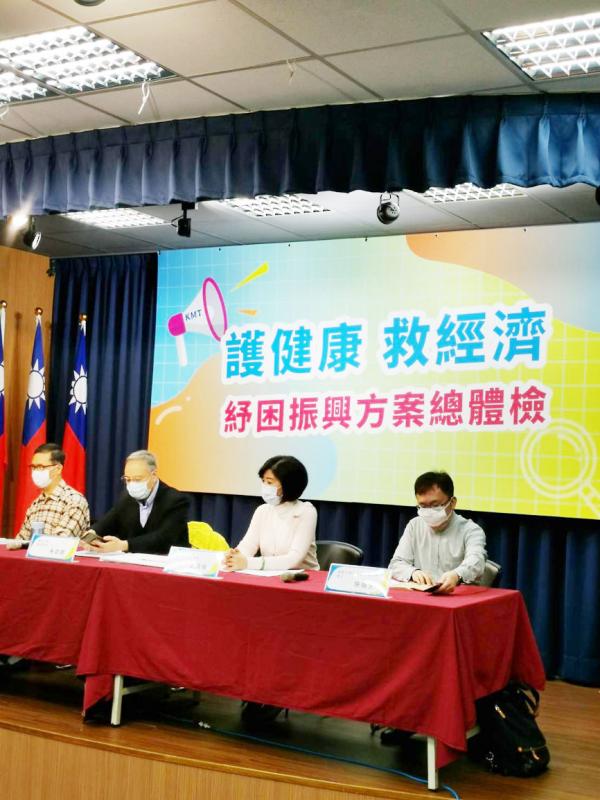Representatives of Taipei’s traditional markets yesterday called on the central government to introduce more comprehensive relief measures for vendors to alleviate the economic effects of the COVID-19 pandemic.
The pandemic has caused revenues at traditional markets to fall by an average of about 20 to 40 percent, Muxing Market (木新市場) representative Liu Su-chin (劉素琴) said at a news conference held by the Chinese Nationalist Party (KMT) at its headquarters in Taipei.
Among the vendors at traditional markets, food and beverage stalls have lost the most revenue, Liu said.

Photo: Shih Hsiao-kuang, Taipei Times
Although traditional markets have been included in the places where the government’s stimulus vouchers can be used, the vouchers would not be distributed until after the pandemic ends, Dongsanshui Street Market (東三水街市場) representative Hsiao Ming-hung (蕭銘宏) said.
The situation continues to worsen and it is unknown when it would end, he said, adding that traditional market vendors are having a tough time surviving.
Chenggong Market (成功市場) representative Chen Chung-ming (陳中明) said that although the government plans on giving people NT$800 in stimulus vouchers, they would be issued as NT$200 vouchers to be spent in four categories of businesses.
Chen said that NT$200 is too small a sum for each category.
Moreover, vendors and consumers at traditional markets tend to be older, and have fewer opportunities to use the vouchers, he said.
To encourage people to visit traditional markets, Xining Market (西寧市場) representative Chuo Wen-shui (卓文水) said the government should subsidize the costs of the supplies and personnel needed to disinfect and clean their premises.
Chuang Chih-tsung (莊志宗), a representative from a national association of traditional markets, said that people not wearing masks when entering some markets could be fined NT$30,000 to NT$60,000.
However, the Taipei City Government said it would not fine people.
The new rule would discourage people from shopping at traditional markets, he said.
He urged the government to subsidize traditional markets’ purchase of prevention equipment such as infrared body temperature sensors.
Like taxi drivers and self-employed workers, traditional market vendors should be eligible for NT$10,000 in subsidies per month for up to three months, association chairwoman Pan Ai-yu (潘愛玉) said.
There are 833 traditional markets across Taiwan, with 73,959 vendors, Pan said.

The manufacture of the remaining 28 M1A2T Abrams tanks Taiwan purchased from the US has recently been completed, and they are expected to be delivered within the next one to two months, a source said yesterday. The Ministry of National Defense is arranging cargo ships to transport the tanks to Taiwan as soon as possible, said the source, who is familiar with the matter. The estimated arrival time ranges from late this month to early next month, the source said. The 28 Abrams tanks make up the third and final batch of a total of 108 tanks, valued at about NT$40.5 billion

Two Taiwanese prosecutors were questioned by Chinese security personnel at their hotel during a trip to China’s Henan Province this month, the Mainland Affairs Council (MAC) said yesterday. The officers had personal information on the prosecutors, including “when they were assigned to their posts, their work locations and job titles,” MAC Deputy Minister and spokesman Liang Wen-chieh (梁文傑) said. On top of asking about their agencies and positions, the officers also questioned the prosecutors about the Cross-Strait Joint Crime-Fighting and Judicial Mutual Assistance Agreement, a pact that serves as the framework for Taiwan-China cooperation on combating crime and providing judicial assistance, Liang

A group from the Taiwanese Designers in Australia association yesterday represented Taiwan at the Midsumma Pride March in Melbourne. The march, held in the St. Kilda suburb, is the city’s largest LGBTQIA+ parade and the flagship event of the annual Midsumma Festival. It attracted more than 45,000 spectators who supported the 400 groups and 10,000 marchers that participated this year, the association said. Taiwanese Designers said they organized a team to march for Taiwan this year, joining politicians, government agencies, professionals and community organizations in showing support for LGBTQIA+ people and diverse communities. As the first country in Asia to legalize same-sex

MOTIVES QUESTIONED The PLA considers Xi’s policies toward Taiwan to be driven by personal considerations rather than military assessment, the Epoch Times reports Chinese President Xi Jinping’s (習近平) latest purge of the Chinese People’s Liberation Army (PLA) leadership might have been prompted by the military’s opposition to plans of invading Taiwan, the Epoch Times said. The Chinese military opposes waging war against Taiwan by a large consensus, putting it at odds with Xi’s vision, the Falun Gong-affiliated daily said in a report on Thursday, citing anonymous sources with insight into the PLA’s inner workings. The opposition is not the opinion of a few generals, but a widely shared view among the PLA cadre, the Epoch Times cited them as saying. “Chinese forces know full well that